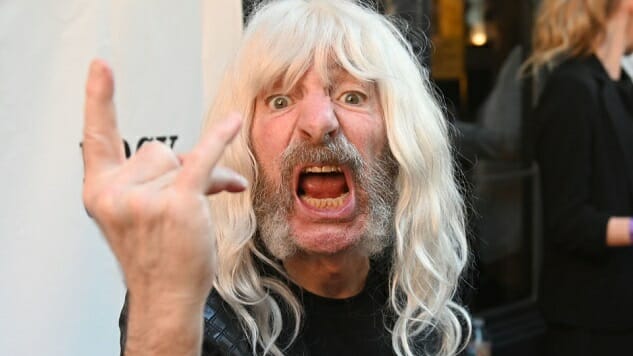Derek Smalls Taps Into the Glory of Rock with his Solo Album and Shows
Photo courtesy of Getty Images
Derek Smalls, the legendary bassist for Spinal Tap, is bringing his Lukewarm Water Live! tour to the Wiltern in Los Angeles on Wednesday, Sept. 6. Paste recently spoke to the elder statesman of rock about the show, his 2018 album Smalls Change (Meditations Upon Aging), and how rock ‘n’ roll has changed in the decades since This Is Spinal Tap revived their careers in 1984.
Paste: Why was this the right time to do a solo tour and album?
Derek Smalls: Well, because I’m going to be dead soon. Hurry on up, then. Y’know. I’ve been waiting patiently for the band to reform and that’s not going to happen, so I saw this advert from the British Fund for Aging Rockers, which apparently uses the money left over from austerity to give money to aging rockers, hence the name. I applied and they said “what’s your idea” and I said “my idea is that you give me money and I make a record.” And that turned out to be the magic words that opened the door.
Paste: When was the British Fund for Aging Rockers established? And what exactly is its remit?
Smalls: I think the name is rather self-explanatory. They give money to aging rockers. It was founded, I think, in 2015, that’s what the logo says in very small font size. But that’s when I found out about it, a year or two after that, I was over in Albania playing with a friend of mine who was a near-death metal band called Chainsaw Vermin and that’s when I saw the advert.
Paste: You mentioned that it doesn’t seem like a Spinal Tap reunion will be in the cards again. How do David St. Hubbins and Nigel Tufnel feel about your solo work?
Smalls: I don’t think the cards are going to be in the cards, to tell you the truth. I have not heard from David. I hear from him, I get occasional letters in the post, which I open up in anticipation and they’re all Chinese pictograms. I don’t read bloody Chinese pictograms. Nige, who is very complementary, he’s down south of England, has a big spread, and he’s breeding miniature livestock. He took time out from that, which is very hand’s on as you can imagine, to send a complementary note, so I think all’s good in that department. He tried raising miniature horses. You know how guitar players are, they’re very extreme kinds of personalities, so he’s got it so far down to where he can’t find jockeys small enough to ride them. Then he turned to goats—I mean, he didn’t turn to goats, he started breeding.
Paste: Why didn’t he try to breed jockeys small enough to ride the horses?
Smalls: I don’t think that’s legal in the United States. Or in Britain, for that matter. I don’t think you can deliberately try to down breed humans. It happens spontaneously.
Paste: So if you’ve got a west coast tour lined up in November, with a star-studded band. How did you put this group together?
Smalls: Well, I started making phone calls, and just persisted. As with the record, as you noticed—well, perhaps not—is similarly star-studded—actually even more star-studded, because there are a lot of drummers on it as well… but it’s hard to carry extra drummers [live]. We went through that with Tap and it’s not advisable. I’d call, ring them up, and I forget which one it was, but one said that the two words that seemed to typify the spirit of warmth and generosity that was typical of the response was “pity fuck.” And I think that… I take that the right way.
-

-

-

-

-

-

-

-

-

-

-

-

-

-

-

-

-

-

-

-

-

-

-

-

-

-

-

-

-

-

-

-

-

-

-

-

-

-

-

-








































